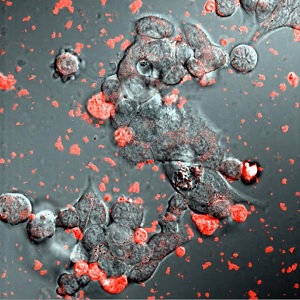 |
| Exosomes (red) loaded with catalase interacting with neurons--Courtesy of UNC |
Exosomes are the small fat and protein bubbles that cells create to manage waste and transport materials. Naturally, then, the vesicles are ideal for use in drug delivery, and researchers are using exosomes to deliver antioxidants to the brain--bypassing the challenging blood-brain barrier--to treat Parkinson's disease.
Marking the first time a large therapeutic protein--in this case, catalase--has been delivered to the brain using exosomes, the scientists from the University of North Carolina at Chapel Hill have extracted the bubbles from immune cells and incorporated them into a nasal spray loaded with the antioxidants, which are known to cut back the inflammation of Parkinson's.
"Exosomes are engineered by nature to be the perfect delivery vehicles for proteins and genetic material," lead researcher Elena Batrakova says. "Catalase is a huge protein, and it is almost impossible to deliver across the blood-brain barrier alone. We use exosomes from white blood cells, which are invisible to the immune system and easily interact and fuse with the blood-brain barrier to deliver their cargo across it."
And because these exosomes are extracted from a patient's own immune cells, they are able to pass freely into the brain.
The researchers published their paper in the Journal of Controlled Release.
- here's the release